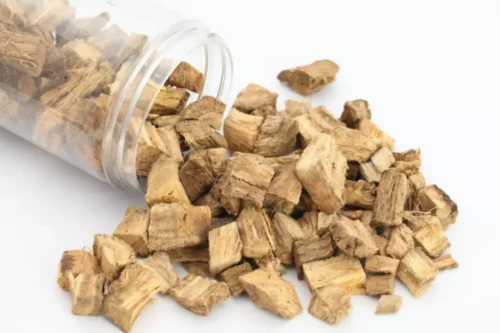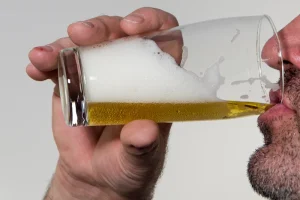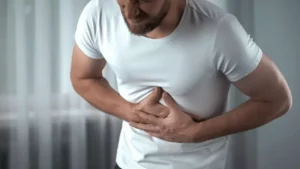
Once in the bloodstream, alcohol travels to every part of the body, affecting organs and tissues. The brain is especially affected by alcohol, where the substance can impact neurotransmitters (chemicals that allow nerve cells to communicate with each other) and lead to changes in behavior. Alcohol (also called ethanol) is processed in the body through a series of steps. When you drink an alcoholic beverage, the alcohol in that drink is rapidly absorbed from the stomach and small intestines into the bloodstream. Talk with your provider if you or someone you know with diabetes has an alcohol problem. Don’t use dangerous equipment, or engage in activities that require coordination, concentration, or alertness.

Explore content

Because insulin restrains glucagon secretion, lower insulin secretion allows increased glucagon secretion, setting the stage for the development of ketoacidosis. Vomiting can lead to dehydration and a reduced blood volume, which, in turn, increases the levels of certain stress hormones in the blood called catecholamines. Catecholamines further decrease insulin production and increase glucagon production. Accordingly, physicians who treat diabetics known to consume large amounts of alcohol must be aware of the risk of alcoholic ketoacidosis in those patients. The hormone insulin, which is produced in the pancreas, is an important regulator of blood sugar levels.
- If you take insulin or certain types of diabetes medicine, it can cause seriously low blood sugar.
- Additionally, research suggests giving up alcohol for just one month leads to weight loss and lower risk of Type 2 diabetes.
- However, this depends on the style of Champagne — dry and brut varieties are low in sugar.
- Here are five habits that may be raising your risk – plus Prof Sattar’s tips to undo the damage.
- Individuals who use glucose-lowering drugs, especially insulin and sulfonylureas, should aim to keep critically aware of their blood glucose levels while drinking and for up to 24 hours afterward.
- The team suggested that added salt likely causes people to eat bigger portions, leading to weight gain, rather than salt itself causing Type 2 diabetes.
Hypoglycemia Unawareness
Liquid sugars are quickly absorbed by the body, so those carbs won’t be much help in preventing or treating a low that may occur hours after you drink. Food, on the other hand, is digested gradually, so it provides better protection against lows. Too much drinking, on can diabetics get drunk the other hand (more than three drinks daily), can lead to higher blood glucose and A1C. If you do drink these with alcohol, your blood sugar may spike and then dip to dangerously low levels. However, their carb content can be virtually the same as that of red wines.
Alcohol and your weight
If you have diabetes and have any type of liver disease, your risk of having further liver problems is greatly increased. This is because both diabetes and liver disease can exacerbate each other’s effects, leading to a more rapid progression of liver damage. Drinking alcohol may also cause an increase in hunger, thanks to its effect on certain hormones and neurotransmitters.

The Long-Term Effect of Moderate Drinking With Diabetes
- In some cases, women with diabetes may have no more than one alcoholic beverage a day.
- Two additional medications—metformin and troglitazone—are now being used to treat people with type 2 diabetes.
- Adjusted hazard ratios of alcohol consumption for incidence of type 2 diabetes according to BMI category adjusted for age, sex, smoking status, and exercise habits.
- This decision was made because we believe that alcohol consumption may also impact blood pressure and lipid levels, suggesting that they could serve as intermediate factors in the onset of type 2 diabetes in our analyses.
Among their many functions, insulin and glucagon regulate the conversion of fat molecules (i.e., fatty acids) into larger molecules (i.e., triglycerides), which are stored in the fat tissue. In the absence of insulin, the triglycerides are broken down into free fatty acids, which are secreted into the bloodstream and delivered to the liver. The liver normally re-incorporates free fatty acids into triglycerides, which are then packaged and secreted as part of a group of particles called very low-density lipoproteins (VLDL). In patients with ketoacidosis, however, the liver metabolizes the incoming free fatty acids in an additional, unusual way. Under the influence of excess glucagon, some of the free fatty acids are converted to ketone bodies and secreted into the blood, causing severe health consequences. Each alcoholic beverage takes about 1-1 ½ hours to finish processing in the liver.
How Alcohol Affects People With Type 2 Diabetes
- When you drink alcohol, your liver has to work to remove it from your blood instead of working to regulate blood sugar, or blood glucose.
- These drinks may prompt a large and rapid blood sugar spike, necessitating the use of insulin (for those who customarily use insulin before meals).
- It might make you feel more relaxed, but it’s not a healthy way of managing these feelings.
- One study found that women who drink moderately have a lower risk of developing type 2 diabetes than women who do not drink.
- This could be three or four glucose tablets, 4 ounces of juice (a small juice box), or five pieces of hard candy (and not chocolate).
- For example, long-term alcohol use in well-nourished diabetics can result in excessive blood sugar levels.
Plus find out how many calories a margarita has, if a glass of wine will spike blood sugar, if a beer will derail your diabetes meal plan and more. From wine and spirits to beer and cocktails, our guide to drinking with diabetes tells you all you need to know about mixing alcohol and diabetes. Along with the higher risk of heart disease, stroke, and cancer, drinking alcohol can lead to other health issues for people with diabetes. However, alcohol can have a negative impact on blood sugar levels in people with type 1 and type 2 diabetes if not consumed responsibly.
What happens in the body when you drink alcohol?
- The fact that alcohol induced brain damages and cognitive dysfunction might precede other complications of alcohol, strongly suggests the need for research on their relationship.
- In addition, insulin inhibits the production of more sugar molecules (i.e., gluconeogenesis) in the liver.
- But if you have diabetes, is it safe to drink alcohol, like a glass of champagne at a wedding or a beer while watching a football game?
- High concentrations of ethanol may lead to reduced insulin binding [13] and inhibition of intracellular signalling related to that of insulin [14].
- Alcoholic beverages are made from grains or fruits (starches or sugars) through the processes of fermentation and distillation, so alcohol cannot be changed into glucose.
- It is a good idea to check with your doctor to see if drinking alcohol is safe for you.




